Listen to the sounds and write the letters.
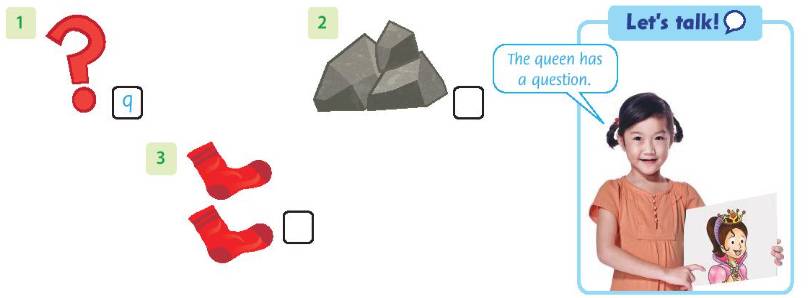
Listen and repeat the words. Pay attention to the sounds /k/ and /g/.
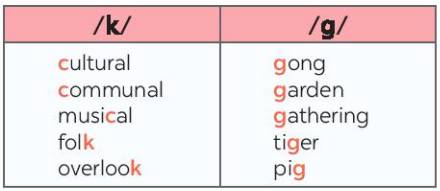
/k/ | /g/ |
cultural /ˈkʌl.tʃər.əl/: thuộc về văn hóa communal /ˈkɒm.jə.nəl/: thuộc về tài sản chung musical /ˈmjuː.zɪ.kəl/: thuộc về âm nhạc folk /fəʊk/: thuộc về dân gian overlook /ˌəʊ.vəˈlʊk/: nhìn trông ra | gong /ɡɒŋ/: cồng chiêng garden /ˈɡɑː.dən/: vườn gathering /ˈɡæð.ər.ɪŋ/: tập trung tiger /ˈtaɪ.ɡər/: con hổ pig /pɪɡ/: con heo/ lợn |
Listen and repeat the words. Pay attention to the sounds /bl/ and /kl/.
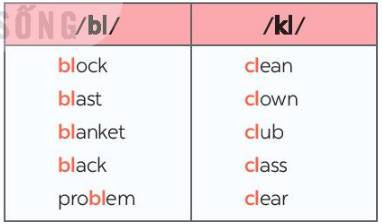
/bl/ | /kl/ |
block /blɒk/: chắn | clean /kliːn/: sạch |
blast /blɑːst/: nổ (bom, mìn) | clown /klaʊn/: chú hề |
blanket /ˈblæŋ.kɪt/: chăn | club /klʌb/: câu lạc bộ |
black /blæk/: màu đen | class /klɑːs/: lớp học |
problem /ˈprɒb.ləm/: vấn đề | clear /klɪər/: trong |
Listen and repeat the words. Pay attention to the sounds /br/ and /pr/.
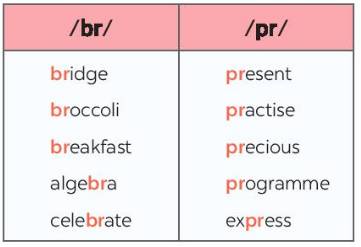
Tham khảo
/br/ | /pr/ |
bridge /brɪdʒ/: cây cầu | present /ˈpreznt/: món quà |
broccoli /ˈbrɒkəli/: bông cải | practise /ˈpræktɪs/: luyện tập |
breakfast /ˈbrekfəst/: bữa sáng | precious /ˈpreʃəs/: quý giá |
algebra /ˈældʒɪbrə/: đại số | programme /ˈprəʊɡræm/: chương trình |
celebrate /ˈselɪbreɪt/: ăn mừng | express /ɪkˈspres/: thể hiện |
Listen and repeat the words. Pay attention to the sounds /n/ and /η/.
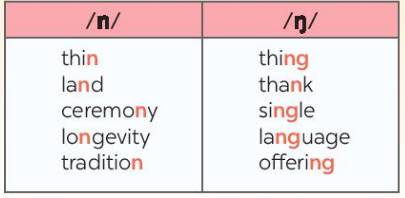
/n/ | /ŋ/ |
thin /θɪn/: gầy | thing /θɪŋk/: nghỉ |
land /lænd/: vùng đất | thank /θæŋk/: cảm ơn |
ceremony /ˈser.ɪ.mə.ni/: nghi lễ, lễ bái | single /ˈsɪŋɡl/: độc thân |
longevity /lɒnˈdʒev.ə.ti/: sự trường thọ | language /ˈlæŋɡwɪdʒ/: ngôn ngữ |
tradition /trəˈdɪʃn/: truyền thống | offering /ˈɒfərɪŋ/: đồ cúng |
Listen and repeat the words. Pay attention to the sounds /ə/ and /ɪ/
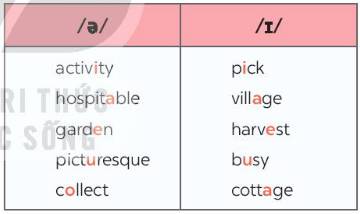
/ə/ | /ɪ/ |
activity /ækˈtɪv.ə.ti/ hospitable /hɒsˈpɪt.ə.bəl garden /ˈɡɑː.dən/ picturesque /ˌpɪk.tʃərˈesk/ collect /kəˈlekt | pick /pɪk/ village /ˈvɪl.ɪdʒ/ harvest /ˈhɑː.vɪst/ busy /ˈbɪz.i/ cottage /ˈkɒt.ɪdʒ/ |
ENGLISH SPEELING
Why does English spelling have a reputation for being difficult? English was first written down when Christian monks came to England in Anglo-Saxon (33) ______. They used the 23 letters of Latin to write down the sounds of Anglo-Saxon speech as they heard it. However, English has a (34) _____ range of basic sounds (over 40) than Latin. The alphabet was too small, and so combinations of letters were needed to express the different sounds. Inevitably, there were inconsistencies in the way that letters were combined.
With the Norman invasion of England, the English language was put at risk. English survived, but the spelling of many English words changed to follow French (35) _____, and many French words were introduced into the language. The result was more irregularity.
When the printing press was invented in the fifteenth century, many early printers of English texts spoke other first languages. They made little effort to respect English spelling. Although one of the shortterm (36) _____ of printing was to produce a number of variant spellings, in the long term it created fixed spellings. People became used to seeing words spelt in the same way. Rules were drawn up, and dictionaries were put together which printers and writers could refer to. However, spoken English was not fixed and continued to change slowly - just as it still does now. Letters that were sounded in the Anglo- Saxon period, like the 'k' in 'knife', now became (37) _____. Also, the pronunciation of vowels then had little in common with how they sound now, but the way they are spelt hasn't changed. No wonder, then, that it is often difficult to see the link between sound and spelling.
Điền vào số (34)
A. longer
B. deeper
C. thicker
D. wider
Đáp án D
A wide range of : đủ loại, một loạt, nhiều. Câu sử dụng so sánh hơn của wide
ENGLISH SPEELING
Why does English spelling have a reputation for being difficult? English was first written down when Christian monks came to England in Anglo-Saxon (33) ______. They used the 23 letters of Latin to write down the sounds of Anglo-Saxon speech as they heard it. However, English has a (34) _____ range of basic sounds (over 40) than Latin. The alphabet was too small, and so combinations of letters were needed to express the different sounds. Inevitably, there were inconsistencies in the way that letters were combined.
With the Norman invasion of England, the English language was put at risk. English survived, but the spelling of many English words changed to follow French (35) _____, and many French words were introduced into the language. The result was more irregularity.
When the printing press was invented in the fifteenth century, many early printers of English texts spoke other first languages. They made little effort to respect English spelling. Although one of the shortterm (36) _____ of printing was to produce a number of variant spellings, in the long term it created fixed spellings. People became used to seeing words spelt in the same way. Rules were drawn up, and dictionaries were put together which printers and writers could refer to. However, spoken English was not fixed and continued to change slowly - just as it still does now. Letters that were sounded in the Anglo- Saxon period, like the 'k' in 'knife', now became (37) _____. Also, the pronunciation of vowels then had little in common with how they sound now, but the way they are spelt hasn't changed. No wonder, then, that it is often difficult to see the link between sound and spelling.
Điền vào số (33)
A. centuries
B. times
C. ages
D. years
Đáp án B
Times (n): thời kỳ, thời đại
Anglo-Saxon times: thời kỳ Anglo Saxon
Tạm dịch: Tiếng Anh lần đầu được viết ra là khi các thầy tu người Cơ Đốc đến nước Anh vào thời kỳ Anglo Saxon
Listen and repeat the words. Pay attention to the sounds /ʊ/ and /u:/. Then put the words into the correct columns.
cook group push June school would woman move |

/ʊ/ | /u:/ |
cook /kʊk/: nấu ăn push /pʊʃ/: đẩy would /wʊd/: muốn woman /ˈwʊm.ən/: phụ nữ | group /ɡruːp/: nhóm June /dʒuːn/: tháng 6 school /skuːl/: trường học move /muːv/: di chuyển |
Listen and repeat the words. Pay attention to the sounds /ʊə/ and /ɔɪ/. Then put the words into the correct columns.
boy tourist toy ensure avoid choice sure tournament |

/ʊə/ : tourist, tournament, ensure, sure
/ɔɪ/ : boy, toy, avoid, choice